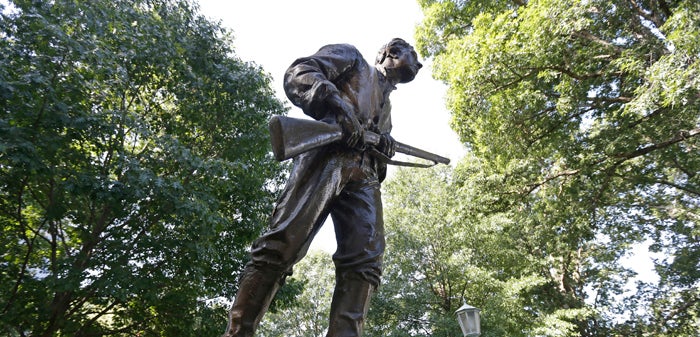N.C. Historical Commission says General Assembly must decide on relocating Confederate statues
Published 12:00 am Thursday, August 23, 2018

- A Confederate monument honoring Henry Lawson Wyatt stands at the state Capitol in Raleigh. AP file photo/Gerry Broome
SALISBURY — The North Carolina Historical Commission decided Wednesday that it does not have the authority to relocate three Confederate statues at Union Square in Raleigh, a move that could set precedent for other monuments in the state.
The commission approved three recommendations:
• The three monuments on the state Capitol grounds are an overrepresentation and over-memorialization (passed unanimously).
• The commission is unable to recommend the removal or relocation of the Confederate monuments because removal or relocation is not required to preserve them. Even if relocation were necessary to preserve them, the specific requirement to relocate objects of remembrance of similar prominence would be difficult (passed 10-2).
• Additional signage with facts and context will be added adjacent to the three monuments, and with the help of the N.C. Department of Natural and Cultural Resources, Gov. Roy Cooper and the General Assembly, additional monuments to memorialize the accomplishments of African-Americans would be erected. (passed 11-1).
Several committee members said they had received comments and petitions from individuals about the Confederate statues across the state, but because of state law, the commission has restricted ability to remove and relocate any monuments.
“Union Square has become a chessboard frozen in time with 14 monuments that can neither be moved, removed or added to,” Noah Reynolds said. “Union Square is located at the heart of our state, and the objects in that square support the promises of our government. We need to consider carefully what the promises of our government are and how we support those promises with the objects of remembrance we place in our state’s most prominent public square.”
Samuel Dixon also addressed the commission’s lack of authority to move the statues, but he said the General Assembly can do so.
“We have a 2015 law that basically says we cannot move monuments,” Dixon said. “The beautiful thing about living in North Carolina and in this country is that if we don’t like laws, we can lobby the General Assembly to change those laws. There is an avenue that this law could be changed if that’s the will of the people.”
The Confederate memorial ‘Silent Sam’ was toppled by protesters Monday at the University of North Carolina at Chapel Hill. In Salisbury, someone threw paint on a Confederate monument depicting a winged muse Fame holding a fallen soldier over the weekend.
Emily Ford of Salisbury Indivisible offered a plan at Tuesday’s City Council meeting to relocate Fame, which stands at West Innes and Church streets.
“City Council should pass a resolution demanding that the N.C. General Assembly return Confederate monuments to local control and allow local elected officials to take steps they believe are necessary to protect their citizens,” Ford said.
“City Council should direct the city manager to begin working with the private owner of ‘Fame’ to arrange for its relocation to a private museum or cemetery,” she continued. “The city should file a formal request to move the statue with the North Carolina Historical Commission.
“City Council should join or create a coalition of other cities where Confederate monuments stand on prominent, public land — join with other city leaders whose hands are tied by the General Assembly. Work with this coalition to change the law when the veto-proof majority is broken in Raleigh,” Ford said.
In a news release Tuesday, the North Carolina Division of the Sons of Confederate Veterans said: “Although lawlessness and mob rule persists in Durham and in Chapel Hill, we are confident that public officials in our state’s Capitol will not follow their example. The people of North Carolina, including the Sons of Confederate Veterans, will not continue to stand as laws are bent and ignored for political purposes.”
After the historical commission vote, Jake Sullivan, chief of staff of N.C. Sons of Confederate Veterans, said, “I can say that we are pleased initially with their decision to ‘pass’ and will be demanding the replacement of illegally destroyed memorials in accordance with the law — as we have demanded all along.”
The North Carolina Department of Administration issued a statement after the commission meeting:
“Considering recent events in Durham and at UNC-Chapel Hill with similar monuments and as noted by the N.C. Historical Commission, it is evident that it’s time the N.C. General Assembly take swift action to amend the 2015 law that prohibits relocation of these monuments — not only to preserve these pieces of state history but also to protect the public from unnecessary safety risks, and to honor and respect the diverse people that comprise North Carolina’s past, present and future.”


